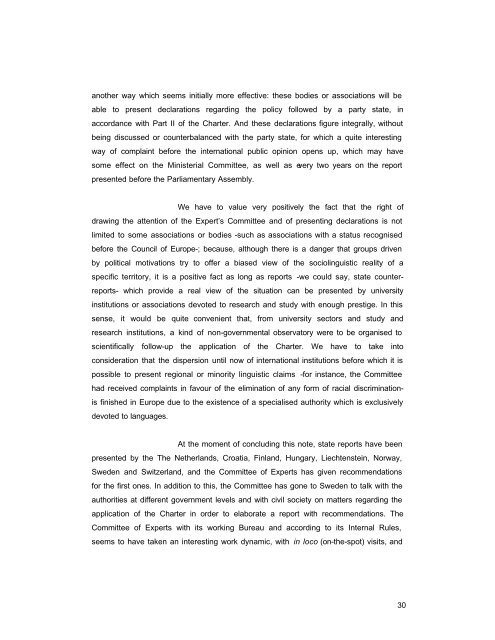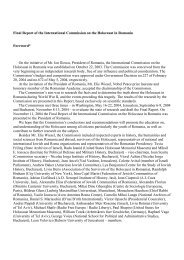get PDF document - MIRIS
get PDF document - MIRIS
get PDF document - MIRIS
You also want an ePaper? Increase the reach of your titles
YUMPU automatically turns print PDFs into web optimized ePapers that Google loves.
another way which seems initially more effective: these bodies or associations will be<br />
able to present declarations regarding the policy followed by a party state, in<br />
accordance with Part II of the Charter. And these declarations figure integrally, without<br />
being discussed or counterbalanced with the party state, for which a quite interesting<br />
way of complaint before the international public opinion opens up, which may have<br />
some effect on the Ministerial Committee, as well as every two years on the report<br />
presented before the Parliamentary Assembly.<br />
We have to value very positively the fact that the right of<br />
drawing the attention of the Expert’s Committee and of presenting declarations is not<br />
limited to some associations or bodies -such as associations with a status recognised<br />
before the Council of Europe-; because, although there is a danger that groups driven<br />
by political motivations try to offer a biased view of the sociolinguistic reality of a<br />
specific territory, it is a positive fact as long as reports -we could say, state counterreports-<br />
which provide a real view of the situation can be presented by university<br />
institutions or associations devoted to research and study with enough prestige. In this<br />
sense, it would be quite convenient that, from university sectors and study and<br />
research institutions, a kind of non-governmental observatory were to be organised to<br />
scientifically follow-up the application of the Charter. We have to take into<br />
consideration that the dispersion until now of international institutions before which it is<br />
possible to present regional or minority linguistic claims -for instance, the Committee<br />
had received complaints in favour of the elimination of any form of racial discriminationis<br />
finished in Europe due to the existence of a specialised authority which is exclusively<br />
devoted to languages.<br />
At the moment of concluding this note, state reports have been<br />
presented by the The Netherlands, Croatia, Finland, Hungary, Liechtenstein, Norway,<br />
Sweden and Switzerland, and the Committee of Experts has given recommendations<br />
for the first ones. In addition to this, the Committee has gone to Sweden to talk with the<br />
authorities at different government levels and with civil society on matters regarding the<br />
application of the Charter in order to elaborate a report with recommendations. The<br />
Committee of Experts with its working Bureau and according to its Internal Rules,<br />
seems to have taken an interesting work dynamic, with in loco (on-the-spot) visits, and<br />
30












